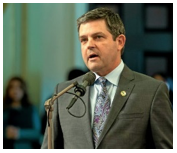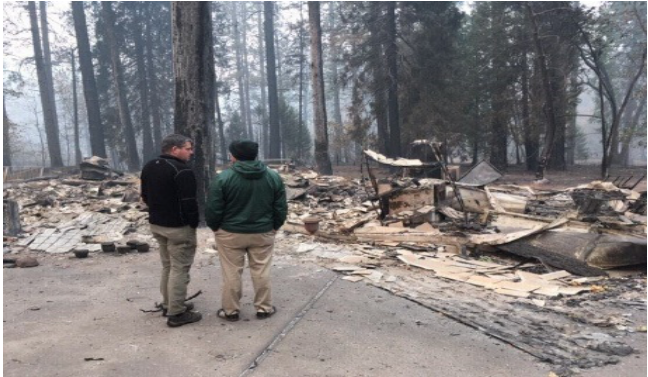CommentsCAL MATTERS -- The sun was beginning to set as Jim Wood stepped out of the examination room at the Sacramento morgue and padded into the lobby, white surgical booties covering his shoes.
He’d keep working there late into the night but was taking a short break from the solemn task of identifying bits of human remains gathered from the rubble of the horrific Camp Fire. (Photo above: Assemblyman Jim Wood, left, surveys Camp Fire damage in Paradise with Loren Lighthall, principal of Paradise High School. Photo courtesy of Jim Wood. )
Wood is a forensic odontologist—a dentist with special training to identify dead bodies by examining teeth. He’s also a Democratic state assemblyman from Sonoma County. Those dual responsibilities have put him on the frontline in tackling two enormous, heart-wrenching puzzles: identifying the people who perished this month in California’s deadliest wildfire, and figuring out what state policies could prevent such catastrophes in the future.
“I thought that last year was really, really awful,” Wood said of the Wine Country fires that killed 44 people, including some whom he identified through dental records.
“I don’t think anybody expected that this year would be way worse.”
This summer Wood served on the special legislative committee that crafted a $1 billion plan to prevent wildfires—an amount he argued wasn’t sufficient for the massive task at hand.
But for years before he was elected to the Legislature in 2014, Wood was a family dentist. Along the way he sought extra training in forensic odontology and eventually became one of just 100 people in the United States who are certified at the highest level in the trade. He traveled the country to help identify victims of America’s worst disasters, including Hurricane Katrina in New Orleans and the 9/11 attack on New York.
More recently, Wood has put his skills to use a lot closer to home. Last year, he helped identify victims of the massive fire in Santa Rosa, just down the road from his house in Healdsburg. Last week he was surveying the damage in Paradise, where the Camp Fire killed at least 79 people and destroyed 11,000 homes. And now, with the Legislature out of session until next month, Wood is stationed at the coroner’s office in Sacramento, part of a team of forensic specialists who are examining the remains arriving from Paradise in body bags.
Teeth. Roots of teeth. Metal crowns and porcelain fillings.
“Most of what I’m seeing today are the roots of teeth. In these really hot fires, the enamel, or the white part of the tooth, often pops off the tooth,” Wood explained as he spoke in the lobby of the morgue.
“While those roots and parts of the teeth will survive, the jaw bone that supports the teeth is often burned away. So, what we get are a bunch of teeth but no way to associate them. So, we use our knowledge of anatomy and the shapes of teeth, and I reconstruct. I look for a way to figure out how they would have looked in the mouth.”
Wearing a white lab coat and rubber gloves, Wood arranges the dental remains on a big examination table. After he reconstructs a mouth, the next phase of detective work begins: Gathering dental x-rays and other records of people on the missing persons list, and matching those images to the remains in the morgue.
It’s been difficult, Wood said, because many dental offices in Paradise burned up in the fire, and with them, the records that could help identify victims. But he’s scouring other sources for x-rays that were saved electronically. About 700 people remain on the missing persons list, a number that has been fluctuating dramatically.
Mark Essick, sheriff-elect of Sonoma County, said Wood was a key player in helping law enforcement identify victims after the fires there last year. The sheriff’s department calls him in to help solve other cases that involve dental remains.
 “He’s kind of a wizard,” Essick said. “He’s magic at what he does in helping us identify people.”
“He’s kind of a wizard,” Essick said. “He’s magic at what he does in helping us identify people.”
(Assemblyman Jim Wood. Photo via Ukiah Daily Journal)
In between the deadliest infernos of last year and this year, Wood served on the special legislative committee focused on wildfire prevention. With his calm demeanor and measured tone of voice, he sat through long hearings on forest management, utility liability and emergency alert systems. He pushed for spending more money thinning forests, something he said would benefit his rugged district that stretches from Santa Rosa to the Oregon border.
During the hearings, Wood didn’t publicly discuss his work identifying constituents who died in the brutal flames. But at one point in a late July hearing, he lost his patience.
“People are dying,” Wood said to Public Utilities Commission President Michael Picker, who had just described a lengthy bureaucratic process for approving utilities’ fire mitigation plans.
“I don’t want to be here five years from now, when millions more acres may have been burned in California and many, many more lives have been lost, wondering what the heck were we doing. So, I apologize for my passion. But…this is my district. This is where 44 of my constituents died and I don’t want to see any more die.”
Authorities said 16 of last year’s fires involved Pacific Gas & Electric equipment, creating the possibility that the company will face billions of dollars in liability. PG&E and other utilities were intensely lobbying the wildfire committee this summer, seeking a change to liability laws and a plan to help them avoid bankruptcy by spreading their costs out over time. In so doing, they showered politicians with campaign contributions, Giants tickets and steakhouse dinners.
Wood was the only fire committee member to return PG&E’s campaign donation, forgoing its $1,000.
“I know how some of my constituents feel about PG&E,” Wood said. “I just didn’t feel comfortable taking the contribution.”
The cause of the Camp Fire has not yet been identified, but PG&E reported problems with its electrical lines outside of Paradise just before the fire broke out.
Wood is urging that wildfire prevention continue to be a focus when the Legislature reconvenes next month. He wants the state to do something big—and quick—though he acknowledges that he doesn’t yet know what that should be.
It’s likely to be a painstaking process, but as Wood heads back into the morgue’s exam room, he seems to have become accustomed to painstaking work.
















